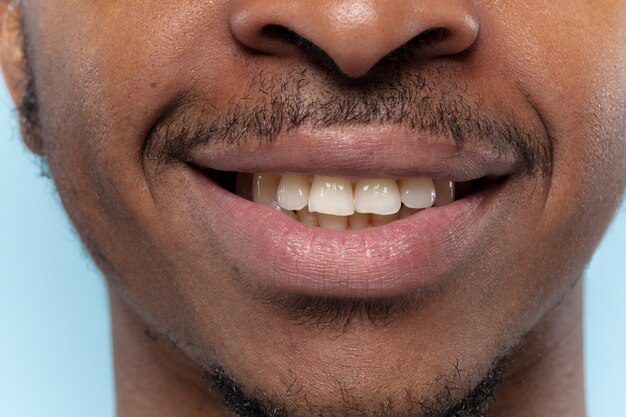This content is for informational and educational purposes only. Always consult a qualified healthcare provider.
Last Updated on January 23, 2024 by Grace Oluchi
The difference between tooth scaling and Root planing is that scaling is a dental procedure that removes dental plaque and tartar (hardened plaque) from the surfaces of your teeth, basically the one you see when you smile. While root planing is when tartar is removed from the roots of your teeth, right below your gum line. It smoothes the root. Both of them aren’t different, however, they do serve slightly different purposes but still work together.
Scaling and root planning are the most common deep-cleaning and preventive gum disease procedures of the teeth. It is recommended that it be done regularly for healthier and whiter teeth.
We’ll further look at the ways both of them work, when you may need to do them, the pain level, and other important factors to keep in mind, regarding tooth treatment.
📋 Table of Contents
More about what Tooth Scaling is
On a more elaborate scale, the primary goal of scaling is to remove dental plaque and tatar from the tooth surfaces, both above and below the gumline. It targets the visible surfaces of the teeth and the pockets formed between the teeth and gums. The process usually entails the use of special dental instruments, such as scalers or ultrasonic devices, to carefully scrape away the buildup of plaque and tartar.
Dental plaque is a soft, bunch of bacteria that forms on the teeth, and if not removed, can cause various dental diseases, including cavities and gum disease. And in other worst-case scenarios, tooth loss. This is why you need to regularly go from dental cleaning to prevent oral health problems and keep your gums healthy. The amount of times you may need scaling may vary depending on your oral health needs and what your dentist recommends.
More about Root planning
In the case of root planing, the dentist performs this procedure to treat gum disease, specifically when it has advanced, and has become periodontitis. The main goal of root planing is to eliminate bacterial toxins, remove plaque and tartar from the tooth roots, and smooth the root surfaces of the teeth. If you have gum disease, the gum pockets around your teeth will have deepened, thus allowing tartar deposits to form under the gum line. In such events, a dentist will scale away any tartar and perform any necessary root planning at the same time.
The instruments used by the dentist are curettes or ultrasonic scalers, to eliminate bacterial toxins and irregularities on the roots.
In most cases, both scaling and root planing are used in combination when performing deep cleaning for people with gum disease. They are both different in process but have the same goal.
My top seven unavoidable signs that says you need scaling and root planing.


1 . If your gums begin to swell, redden, or feel tender. These could mean that you have early signs of gingivitis, an initial stage of gum disease. And if you don’t attend to it quickly, gingivitis can progress to something more dangerous.
2 . Bleeding gums are also a sign of gum disease. Things like bleeding while brushing, eating, or flossing. You shouldn’t be bleeding when you clean your teeth and perform good oral care. You’re going to have to take it seriously if this occurs.
3 . Receding gums where the roots of your teeth are exposed, could mean that your gum disease has advanced and you need to under a deep cleaning process.
4 . Bad breath could mean something, especially when you just cleaned it. There may be bacteria present in your gums that’s why basic oral care won’t work.
5 . Pain when you bite food can mean something is wrong. Your teeth shouldn’t hurt when you’re eating, not especially when you’re eating your favorite burger!
6 . When you visit your dentist and they begin to examine your teeth, they measure the depths of pockets in between your teeth and gums. If they’re deeper than normal, your dentist may need to perform a deep cleaning to remove accumulated plaque and tartar. And they might need to perform scaling and root planing.
7 . Loose teeth can also be a sign. When your teeth become weak and shaky it can mean they’re in danger. Because they shouldn’t feel loose, so make sure you visit the dentist to get them checked.
How much do I rate the pain of scaling and root planing procedure (deep cleaning)
Scaling and root planing shouldn’t hurt at all. I give it a 95 percent pain-free process. Why I give this to you because before your dentist starts the process, you by use local anesthesia to numb the area they plan to work on. Which should be a little to zero pain for you.
However, you may feel pressure or vibrations when your dentist is using deep cleaning instruments to remove plaque, tartar, and bacteria. But they shouldn’t be painful, but they could be noticeable. Overall, if you feel any pain during the process, let your dentist know about it immediately. You’re not supposed to go through pain during deep cleaning, as it’s not inevitable (unlike childbirth yikes!)
My thoughts on what you should expect after tooth scaling and root planning procedures.


1 . After tooth scaling and root planning, it’s highly likely you experience some tooth sensitivity or mild discomfort. And it may interfere with your time with food. The good news is that it is temporary and can be managed with over-the-counter pain relievers, preferably the ones your dentist suggested. However, if they’re persistent and the medications don’t seem to work, you’ll need to revisit your dentist.
2 . Your gums may swell or be very tender for a little period of time after the procedure. But it’s all part of the healing process, so don’t worry. This is why you need to maintain good oral hygiene to quicken your recovery process.
Everyone’s pain tolerance is different and varies as well. Some people may feel little pain, while others might experience more sensitivity. It’s important to relay your concerns or discomfort during and after the procedure. So that your dentist can adjust the anesthesia or take other measures to ensure that you’re as comfortable as possible. Overall, both tooth scaling and root planning are crucial procedures to treat gum disease and prevent its progression. So just try to manage any discomfort and look at the long-term benefits for your oral health.
The advice I’d give to you if I were your dentist after your tooth scaling and root planing procedure.


1 . Don’t rush back to taking Sugary drinks
2 . Avoid cold foods like ice cream, iced drinks, or even water. Basically anything cold.
3 . Drink a lot of water to keep your body hydrated.
4 . No candy, sweets, or chocolates in the meantime.
5 . Eat soft meals and avoid things like breaking chicken bones with your teeth or other breakable meals.
6 . Don’t eat too many crunchy snacks like chips, crackers, and the likes of them.
7 . Invite more fruits and vegetables to your diet, you’re gonna need them more now.
8 . Say no to smoking
9 . Minimize alcohol consumption
10 . Don’t use mouthwash that contains alcohol, it could be harsh on your healing tissues
11 . Control the habit (if you have one) of thrusting your tongue or biting your cheeks, this act irritates the treated areas.
12 . Be gentle when you’re brushing your teeth or flossing, so you don’t bruise the treated area. Use a soft toothbrush and follow the techniques your dentist may have provided.
13 . Try not to miss your medications, it’s very important to complete the use of antibiotics. Endeavor to finish taking them to prevent infection.
14 . Attend all appointments with your dentist. Never miss any appointments because your dentist will want to monitor your healing process and ensure everything is going well.
You don’t have to completely stop eating your favorite snacks and drinking your favorite drinks, despite the temperature. But they can interfere with the healing process, you need to give your teeth time to heal. After a few days, you can ask your dentist if it’s okay to indulge them slowly.
My super amazing strategies to avoid gum diseases completely.
1 . Brush regularly. Do it twice a day using fluoride toothpaste. Buy a soft-bristled toothbrush and brush slowly, with emphasis on slowly, and brush in circular motions to remove plaque effectively, without hurting your gums.
2 . Start flossing daily because your toothbrush can’t reach every area of your mouth, so flossing is a great way to prevent gum disease. You can get dental floss or interdental brushes to get the best out of your oral care process.
3 . Keep a healthy diet by eating rich foods, such that contain fruits, vegetables, whole grains, and lean proteins. Reduce your intake of sugary snacks and beverages, because they can contribute to plaque formation.
4 . Stay away from smoking and tobacco. They both can increase the risk of gum disease and slow healing. Quitting smoking can drastically improve your oral health.
5 . Manage health conditions like diabetes, because such issues can increase the risk of gum disease.
6 . Drink water before, during, and especially after meals to prevent gum disease and also prevent other health complications. Water is amazing and is the best liquid you need to stay alive so make sure you get enough of it.
7 . Use antiseptic mouthwash to reduce plaque and prevent bacterial growth. However, in no way should you replace it with brushing and flossing your teeth.
8 . Start getting dental check-ups, and visit your dentist even if you’re not suffering from any signs of gum disease. Because you don’t have to develop oral issues before you see a dentist. Paying your dentist a visit for professional cleanings and check-ups can even help your dentist detect early signs of gum disease and provide necessary treatment.
Some of the top reasons I feel people let health issues go too far.
1 . They’re too lazy to set up appointments
The crazy thing is that a lot of people may experience all these signs, and still not see the urgency in going to see a dentist. Some may think it’ll go away on its own, others may think they can perform self-care. Although choosing to perform self-treatment isn’t a bad thing, sometimes what you really need is professional attention. So please don’t deny yourself from getting the help that you need.
2 . They’re scared of what they might discover
It’s completely normal and a human thing to be scared to hear the truth about what’s been going wrong all this time. But the longer you take to get checked, the worse the situation can get. You really have nothing to lose, in fact, you’ll be a lot safer when you discover the truth earlier, rather than when things have escalated. So be more courageous and set out to find out what’s happening.
3 . Lack of financial resources
Not everyone has the money for medical provision. This is a sad and hard truth, but you can try to reach out to family and friends to assist you in ways they can. Tell them you might lose your teeth if you don’t get immediate medical attention. You can also reach out to free healthcare centers in your town or city to assist you. Some people even set up a fund on social media and get strangers to help them get treatment.
4 . Fear of feeling like a burden on others
You could choose to keep silent on your health because you don’t want it to seem like you’re a burden to others. But you should know that keeping quiet about it isn’t a better choice. It’s okay to let those around you know about your situation because you never know who will help you. Don’t be afraid to depend on family and friends, and talk to them about the help that you need.
Your health will always be of topmost importance, please never forget that. You truly deserve to be healthy. So don’t let any of these hold you back from getting the help that you need.

